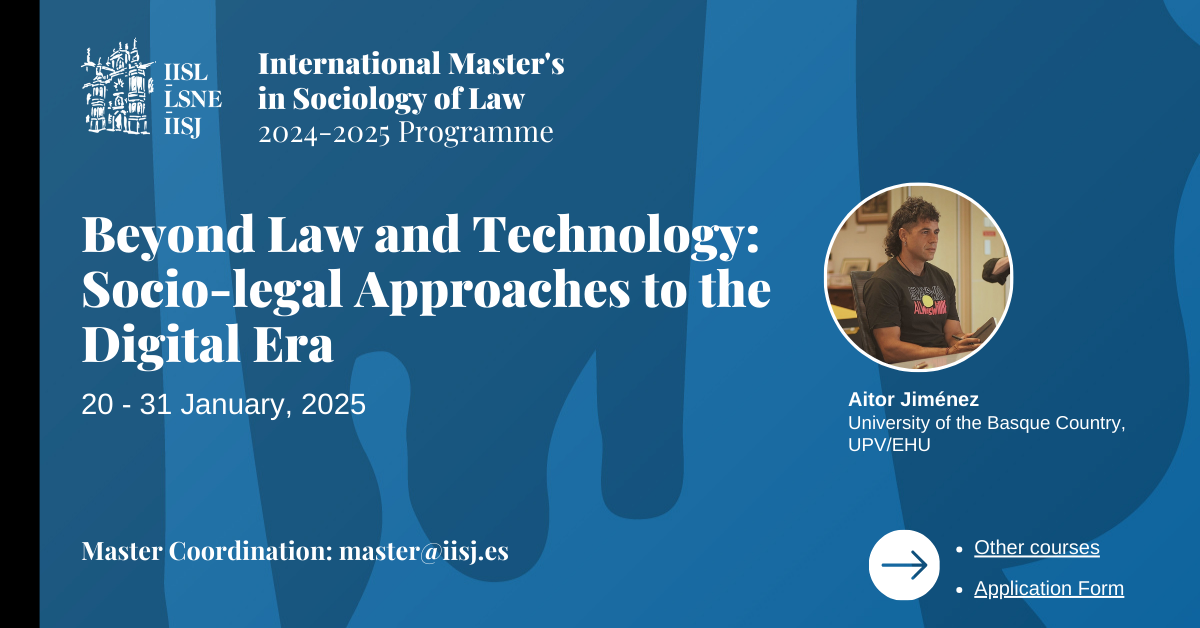Course description in the Module "New Issues in Socio-Legal Studies (3 ECTS)"
On any given day, people in cities as diverse as Melbourne, Mexico City, Tangiers and Shanghai interact with dozens of digital technologies. These systems, while relatively new, permeate every aspect of their lives, from leisure and entertainment to work, surveillance and bureaucracy. Many of these technological operations are simple (and even convenient). For example, a platform can suggest a really good song or show one advertisement instead of another. Although this can be problematic, as we will see, it has little direct or immediate impact on people's lives. In other cases, however, the activation of algorithmic decision-making systems by governments, administrative bodies or law enforcement agencies can have profound, even catastrophic, consequences. These include automated systems used to determine welfare benefits (as has happened in countries such as the Netherlands or Australia), predictive policing tools used in the US or China, and AI-powered military targeting systems used by powerful armies such as Israel in Palestine.
As anti-racist and feminist technologists have pointed out, the consequences of these systems extend beyond their effects on individuals to disproportionately affect historically marginalized groups. But that is only part of the problem. The reach of these vast socio-technical systems is not limited to human societies; their impact is planetary. For example, cloud computing alone now consumes more carbon than the entire aviation industry combined. These technologies depend on a global supply chain and infrastructure, linking mines, factories, transoceanic cables, satellites, data centres, and power plants. It would, however, be an oversimplification to view this phenomenon -alternatively referred to as surveillance capitalism, digital capitalism, or cybernetic capitalism- as autonomous or ahistorical. On the contrary, it is a social development rooted in particular corporate and state interests. These systems reflect specific anthropological, ethical, economic, political, and ideological visions that have evolved over time.
This course invites students to critically examine the emergence of digital capitalism and the underlying legal-political ideology that sustains it. What concepts of science, nature, the individual and the law underpin this socio-technical model? What ethics of justice influence the frameworks that shape digital capitalism? How do corporations and states propagate ideological visions that define the parameters of our technopolitical existence? What alternatives are being proposed to challenge digital capitalism? By exploring these questions at the intersection of law, technology and political economy, the course aims to equip students with the tools necessary for critical analysis of the techno-social realities that shape our world.
Learning Outcomes:
This course aims to equip students with tools for understanding and analysing key socio-legal issues related to the emergence, rise, and alternatives to the current model of digital capitalism. By the end of the course, students will be able to:
- Identify the historical and genealogical processes that gave rise to this techno-social model.
- Critically analyse relevant issues inherent in the various dimensions intertwined with digital capitalist institutions and practises.
- Apply the knowledge acquired to draft socio-legal academic documents that analyse, critique, or reflect on the dimensions studied.
Course Summary
- Law, infrastructures and capital
- Law as Technology
- Infrastructure as politics
- Capital as law
- Science, power and racism
- Science and colonialism
- Statistics and population
- (counter)Genealogies of Datafication
- The colonial roots of Surveillance
- The Rise of Digital Capitalism
- Silicon Valley and the (not so) digital frontier
- The legal production of platform capitalism
- Platform & Infrastructural power
- Regulating digital platforms
- The Crimes of the (digital) powerful
- White collar crime and the crimes of the powerful
- Big Tech Criminality
- Work, factories and algorithmic exploitation
- Work, labour, exploitation
- Algorithmic regulation
- Resistance
- War, police, machines and bodies
- War
- Borders
- Policing
- The materiality of the digital
- Extractivism
- Logistics
- Data centres, grids and people
Case Study: “Will the Real Eco-Terrorists Please Stand Up?”
- AI Politics
- What is actually AI?
- AI Political Economy
- AI for good?
- Regulatory scenarios
- Decolonial Futures
- Luddism 2.0.
- Thinking the commons
- Decolonial horizons




